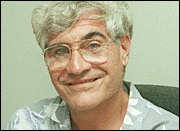Advertisement - Click to support our sponsors.


View Point
KOREANS are openly nervous about what George W. Bush's election portends for the Korea peace process, but many also seem privately hopeful that the incoming president might, as one security analyst put it, "save us from ourselves." Bush should
approach North Korea
cautiouslyThe anxiety is based on the (grossly exaggerated) assumption that a Republican administration will take a more hardline approach that could somehow undermine the South's engagement policy toward the North. No one wants to see this happen. But there are many who are concerned about the current fast pace of rapprochement and especially about what they perceive to be its one-sided nature. They are therefore hopeful that a firmer U.S. approach might have a sobering effect on Seoul while also compelling Pyongyang to be more forthcoming with the South.
It is important for Bush to send an early signal to both Koreas that his administration is committed to the process of engagement and fully supportive of ROK President Kim Dae-jung's Sunshine Policy. This includes signaling continued support to the U.S.-DPRK Agreed Framework under which the North froze its earlier nuclear research activities in return for the eventual construction of two less proliferation-prone light water reactors.
America's commitments to its allies and agreements with others do not change when administrations change; the guiding principle is U.S. national security interests. Support for the Sunshine Policy and continued adherence to the Agreed Framework (as long as Pyongyang continues to honor its promises) are in America's national interest.
I have argued that a last-minute trip to North Korea by President Clinton would be counterproductive to the broader peninsula peace process and should not occur; Clinton has now decided not to go. However, Bush should be prepared to continue high-level contacts to signal (to Seoul as well as to Pyongyang) America's continued commitment to the peace process. A general timetable and set of milestones should also be set for continued high-level interaction.
A significant breakthrough in ongoing missile negotiations is not sufficient to justify a meeting between North Korean leader Kim Jong-il and President Bush. Nor should these talks detract from the broader peninsula peace process.
I would recommend the following game plan: As they are today, the missile talks should be aimed at accomplishing a variety of objectives. First is a halt to the North's destabilizing missile export program. This should be the easiest to deal with since, from Pyongyang's perspective, only money and not national security is involved. On a very good year, Pyongyang can only hope for about $100 million in revenues for its missile sales.
Demands for from $1-$3 billion to terminate exports are therefore ridiculous, but show North Korea's willingness, if not eagerness, to bargain on this point.
More sensitive are the issues of continued research and development and actual deployment of medium- and long-range missiles, since Pyongyang, rightly or wrongly, sees its limited missile capability as some sort of insurance policy against U.S. attack or intimidation. The United States, wisely, has insisted that negotiations deal with medium-range missiles capable of threatening Japan (and U.S. bases in Northeast Asia) as well as the longer range system theoretically capable of threatening portions of the United States. One has to wonder, however, why Tokyo is not an active participant in these negotiations, since Japan's security interests are also at stake.
A significant missile breakthrough could warrant a visit by a very senior U.S. official, but only if it paralleled greater North-South cooperation on security matters. To date, North-South cooperation has been primarily in the economic and social spheres. However, true peace will not be achieved unless and until Pyongyang acknowledges Seoul as its primary interlocutor on the issue of peace on the peninsula.
In its own high-level dealings with the North, Washington must be careful not to reinforce the long-held DPRK view that the United States, not South Korea, is the only legitimate negotiator on issues of peace and security. For example, the North, even after the historic leaders' summit and mountains of assistance from the South, still insists that any peace treaty officially ending the Korean War be signed between Pyongyang and Washington, not Seoul.
Bush must reaffirm President Clinton's firm assertion that there will be no separate U.S.-DPRK deal when it comes to the issue of peace on the peninsula.
Another important milestone necessary to demonstrate North Korea's commitment to the peace process is fulfillment of Kim Jong-il's promise to visit the South next spring. Simply put, no U.S. president should visit North Korea until Chairman Kim visits the South and serious North-South security dialogue commences.
If these milestones are achieved, then a Bush-Kim Jong-il meeting would be appropriate but, even then, it would make more sense for their first meeting to be in Washington or on neutral territory. Bush is scheduled to be in Shanghai in September 2001 for the annual APEC leaders meeting. President Kim Dae-jung will no doubt urge the Chinese to invite Kim Jong-il to the meeting as an observer.
THIS would provide a good opportunity for Bush and Kim Jong-il to meet. It would also provide an opportunity for the two Kims to have another face-to-face meeting, but this should be kept separate and distinct from any meeting with Bush.
It should go without saying that any meeting between George W. Bush and Kim Jong-il can only occur after Bush has met with Kim Dae-jung, preferably in Seoul. It would also be a serious blunder for Bush to step foot in China without having first visited both South Korea and Japan. Clinton, in July 1993, made his first Asia visit to Japan and Korea well in advance of that year's inaugural APEC leaders meeting in Seattle.
Bush can do no less without sending the wrong signal about America's commitment to its two key Asian allies.
Ralph A. Cossa is executive director of the
Pacific Forum CSIS (pacforum@lava.net), a Honolulu-based
non-profit research institute affiliated with the
Center for Strategic and International Studies
in Washington.